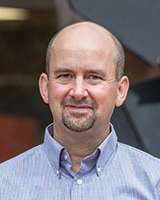Request Username
Can't sign in? Forgot your username?
Enter your email address below and we will send you your username

ASCE Publications: How does this journal differentiate from others in the field?
Shane Brown: We recently changed the name of the journal to focus on civil engineering education. The previous name (Journal of Professional Issues in Engineering Education and Practice (JIP)) meant many different things to different people and made it challenging to develop an identity as a journal. The new name, Journal of Civil Engineering Education, offers clarity for both our authors and readers and allows us to focus on important and contemporary issues of civil engineering education. We aspire to publish high-quality articles that are informative to researchers, instructors, and administrators.
ASCE Publications: How does educational research differ from other civil engineering disciplines?
Shane Brown:The biggest difference between educational research and other disciplines within the civil engineering field is that educational research nearly always involves people as subjects. Research involving human subjects is particularly challenging because humans are able to interpret our surroundings in complex and sophisticated ways. Engineering education studies involve gathering data about individual’s interpretation of their surroundings, or their skills and abilities. Researchers must carefully consider how they gather and interpret this data, and methodologies must comply with best educational research practices, and therefore be valid and reliable.
ASCE Publications: What topics need to be addressed in this space now?
Shane Brown: I would like to see more carefully executed education intervention studies that examine the impact of course, curriculum, or programmatic changes to civil engineering education programs. Intervention studies are critical to the improvement of civil engineering education because they can inform educational and curricular practices. However, these studies must utilize established research methods, carefully describe the intervention, align the measured outcome(s) with the intervention, utilize established instruments, and consider alternate explanations to the effects of the intervention.
Another topic I would like to see covered in more depth are papers examining the civil engineering workforce and how curriculum can be modified to prepare graduates to excel in civil engineering careers. These could include studies on what it means to be an engineer, areas of study that are important and/or crucial to success in the workplace, or aspects of civil engineering education that are most/least helpful to the preparation of students for practice. Studies of this nature will foster one of the primary goals of civil engineering programs— to prepare students for success as practicing civil engineers.
ASCE Publications: What inspired you to become a civil engineer?
Shane Brown: I dabbled in a lot of things as an undergraduate, benefitting from the then inexpensive California community school programs and explored many topics from physics and computer science to golf course management. But what I really liked was the intersection of infrastructure and people. In civil engineering I found that there was a real, tangible connection with the community. The clients, stakeholders and individuals are all interested in infrastructure, and there were much more interpersonal interactions with the public in this space. I saw civil engineering as a way for me to serve humanity. And I worked as a practicing engineer for five years in water and wastewater treatment!
During a stint as a community college instructor, I discovered my love for civil engineering education, and decided to pursue my Ph.D. so I could teach and do educational research. Fifteen years later, I am still teaching, performing research and trying to have a positive impact.
ASCE Publications: What drew you to be an editor?
Shane Brown: The opening of this position as Editor and my recent promotion was a timely coincidence and has offered me an opportunity to give back to the civil engineering community. As a regular author and reviewer with JPI and experience as an associate editor at other similar journals I was honored to be selected by former Editor, Matt Roberts, to fill the role. Being a civil engineering professor is a tremendous privilege, and I hope to utilize this privilege to benefit civil engineering education through my role as editor. .
ASCE Publications: What aspirations do you have for the journal?
Shane Brown: My main goal is to benefit civil engineering education, and this happens through publishing high‐quality and informative articles about diverse issues related to civil engineering education. The review process is an important part of publishing quality papers and my objective in this role is to help authors develop better research papers through the review process. Providing detailed, quality, and useful reviews and associate editor and editor summaries will help authors improve their papers. I want readers to find papers that are helpful and useful for their classrooms and programs, and ultimately for this journal to be a venue to improve civil engineering education.
ASCE Publications: Any advice for new researchers starting out?
Shane Brown: My advice is to learn about best practices in conducting the types of education studies you are interested in. Many authors have done traditional civil engineering research throughout their careers and initially have minimal knowledge about education research. There are numerous resources available to learn about education research, including collaborating with education and engineering education faculty. Good research and quality papers are important for improvement and must be done using best educational practices. I encourage new researchers to develop their expertise through collaborations and professional development opportunities, for the benefit of civil engineering education.
Learn more about the Journal of Civil Engineering Education